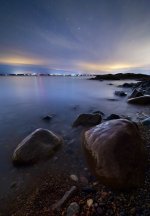- Admin
- #1
Vas (Jack)
Live it fully!
Staff member
1
1
1
- Jan 29, 2022
- 1,904
- 1,435
- Edit my images
- Yes
I know there has been given some advice and information about long exposure . But it’s better to talk about it on dedicated thread.
So back to the subject, how you can take pictures longer than 30 seconds, yes I’ve noticed Bulb option next to 30seconds, but never decided to try. If I choose bulb, for how long I can leave the shutter open? Obviously with my current ND filter.
Would this affect my pictures if the shutter camera will be left for long time?
So back to the subject, how you can take pictures longer than 30 seconds, yes I’ve noticed Bulb option next to 30seconds, but never decided to try. If I choose bulb, for how long I can leave the shutter open? Obviously with my current ND filter.
Would this affect my pictures if the shutter camera will be left for long time?
